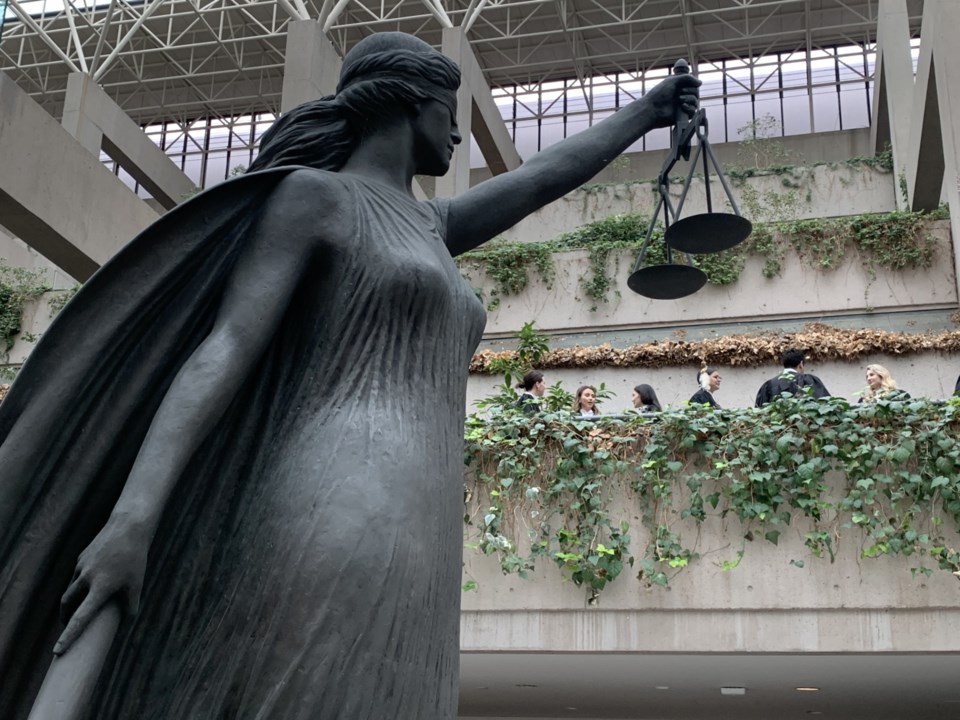A B.C. Supreme Court judge has ordered a life insurance company to pay a widow $400,000 after she had to prove her 59-year-old husband’s death was an accident.
Dr. Raymond Allen and Sun Life entered into an accidental death insurance policy in 2012. His widow Lorie Allen was the sole named beneficiary. The policy provided for $400,000 in benefits.
Hearing the case in Cranbrook, Justice Lyndsay Lyster said Dr. Allen died under very sad circumstances on Jan. 22, 2017.
Ms. Allen subsequently made a claim for the benefits but Sun Life denied that claim.
“It did so on the basis that Dr. Allen did not die as a result of an accident and no other cause,” Lyster said.
On Jan. 19, 2018, Ms. Allen filed a notice of civil claim seeking damages for breach of contract in the amount of $400,000.
The case was heard as a summary trial in which parties must come ready to prove their claim or defence. In such a case, the onus is on the insured person to prove a loss falls within the policy coverage to be eligible for benefits under an insurance contract.
Sun Life applied to have the action dismissed, saying the issue for determination is whether Dr. Allen died as a direct result of an accident, and if so, was the death independent of any other cause.
Ms. Allen submitted that the evidence before the court supports that Dr. Allen’s death was accidental and, as such, the benefits ought to be paid to her.
Dr. Allen’s death
A Jan. 22, 2017 forensic identification examination report said Dr. Allen died in his basement suite in Lethbridge, Alta.
A constable had been asked to check on Dr. Allen because his vehicle had been parked on the street for days and had not moved.
The constable found a lot of blood and Dr. Allen’s body by the kitchen sink.
“His body was found slumped over the kitchen sink with his arms tucked under his torso,” Lyster said. “He was standing with his feet resting on the floor. An empty bottle of vodka was found on the kitchen floor and a two-thirds full bottle of rye was found on the countertop.”
Dr. Allen had last been seen alive four days earlier.
His head, upper chest and torso had blood on them. The constable suspected Dr. Allen had been intoxicated and hit his head.
The temperature in the suite was cool, leading to speculation hypothermia may have played a role in his death.
Although a complete autopsy was not done, a certificate of medical examiner said that the “immediate cause of death” was atherosclerotic cardiovascular disease. She notes that no autopsy was performed.
The manner of death was deemed natural.
A medical history showed Dr. Allen had alcohol use disorder, osteoarthritis of the hip and mental health issues.
Manner of death undetermined
“There were numerous admissions to hospital in the months and years leading up to his death stemming from alcohol abuse, dehydration, impaired consciousness and ingestion of mouthwash,” Lyster said. “There were multiple references to suicidal ideation.”
However, Lyster said, as the manner of death had not been ascertained to a reasonable degree, it was rightly regarded as undetermined.
Sun Life argued that while Dr. Allen’s death may have been unexpected, it was not caused by an accident. It said the death was caused by disease, and that there is no coverage.
“Considering the evidence as a whole, I conclude that Dr. Allen’s death was likely caused by a combination of hypothermia and blood loss caused by the laceration to his head,” Lyster said. “Both hypothermia and loss of blood from falling and lacerating one’s head are, in my view, properly described as accidents.”



